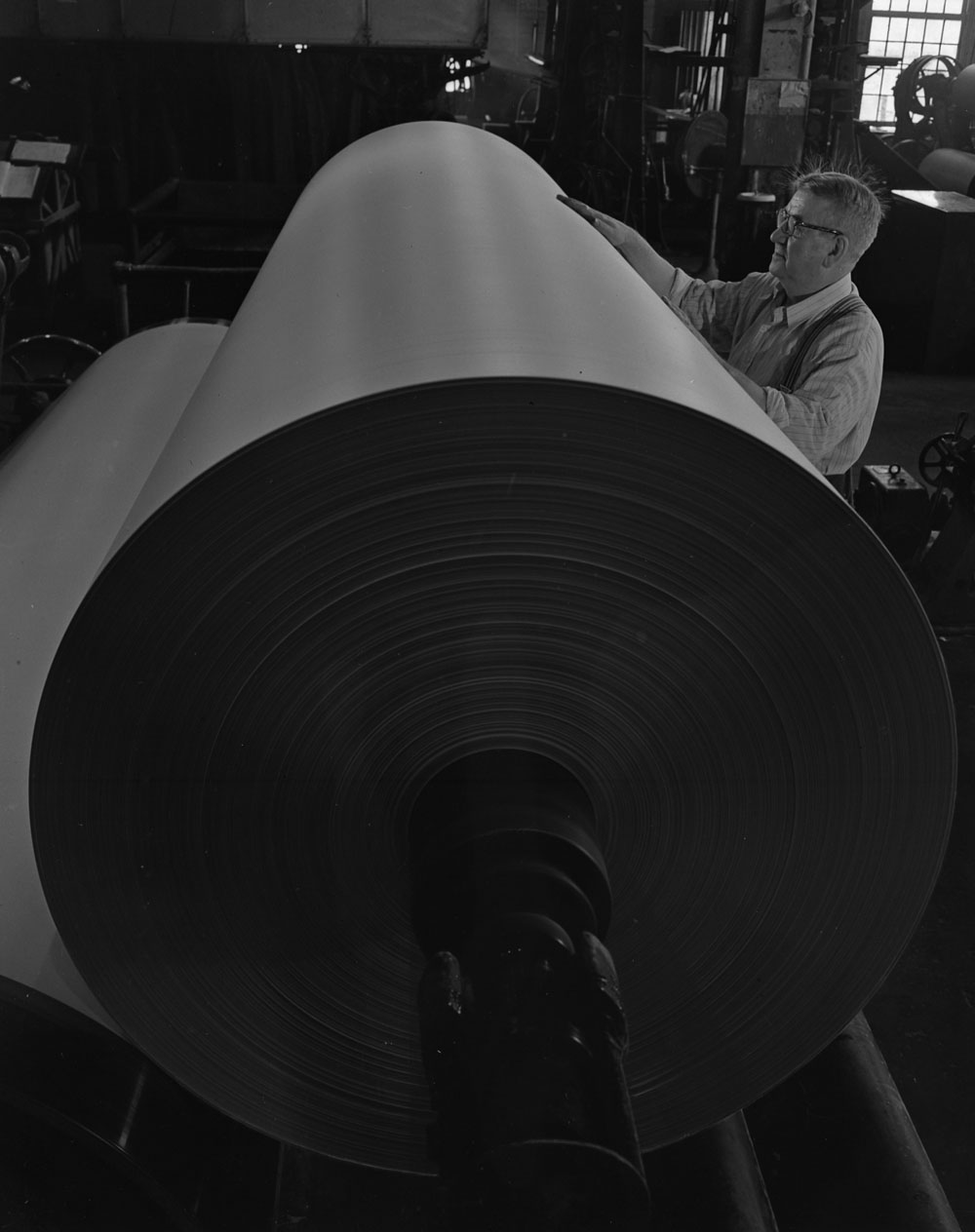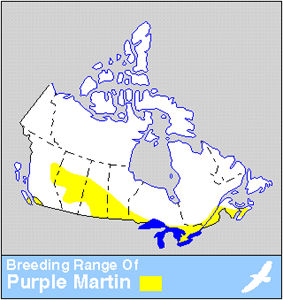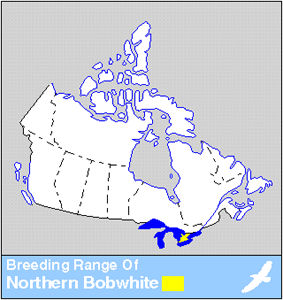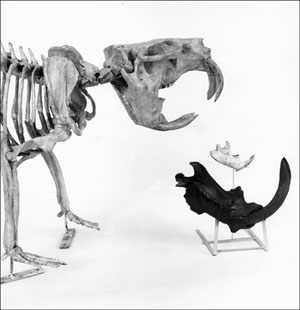Browse "Things"
-
Macleans
Pugwash Wins Nobel Prize
Vivian Godfree had just cleared the morning dishes at her Pugwash, N.S., home when her mother called from the British city of Bristol with surprising news - the 1995 Nobel Peace Prize had been awarded to an antiwar movement spawned in the tiny Nova Scotia village where she lives.This article was originally published in Maclean's Magazine on October 23, 1995
"https://development.thecanadianencyclopedia.ca/images/tce_placeholder.jpg?v=e9dca980c9bdb3aa11e832e7ea94f5d9" // resources/views/front/categories/view.blade.php
https://development.thecanadianencyclopedia.ca/images/tce_placeholder.jpg?v=e9dca980c9bdb3aa11e832e7ea94f5d9
-
Article
Pulp and Paper Industry
The pulp and paper industry consists of manufacturing enterprises that convert predominantly woody plant material into a wide variety of pulps, papers and paperboards. The Canadian industry began in the 1800s and has undergone revolutionary changes over the years. Most recently, the move from newsprint to electronic media caused the industry to decline; however, pulp and paper remains a fundamental part of the Canadian economy, especially for remote and northern communities.
"https://d2ttikhf7xbzbs.cloudfront.net/pulpandpaper/paperrole.jpg" // resources/views/front/categories/view.blade.php
https://d2ttikhf7xbzbs.cloudfront.net/pulpandpaper/paperrole.jpg
-
Article
Pulse Crops
Pulse crops are members of the family Leguminosae or Fabaceae (see LEGUME). The term "pulse crops" generally refers to those plant species harvested primarily for dry seed that is used as both human food and animal feed.
"https://d2ttikhf7xbzbs.cloudfront.net/media/media/8e804f6a-faf5-40ac-966e-493d9162961b.jpg" // resources/views/front/categories/view.blade.php
https://d2ttikhf7xbzbs.cloudfront.net/media/media/8e804f6a-faf5-40ac-966e-493d9162961b.jpg
-
Article
Pump Drill
The pump drill was used by Indigenous peoples to start fire and drill holes into materials such as wood, shell, bone and stone. While modern power tools replaced the pump drill after the 19th century, some specialized craftspeople continue to use the tool.
"https://d2ttikhf7xbzbs.cloudfront.net/media/media/3a1cfe9e-880e-463c-b92d-56c5c0ee873a.jpg" // resources/views/front/categories/view.blade.php
https://d2ttikhf7xbzbs.cloudfront.net/media/media/3a1cfe9e-880e-463c-b92d-56c5c0ee873a.jpg
-
Macleans
Pumped to find another way
With Keystone XL and the Northern Gateway mired in controversy, the industry turns to Plan BThis article was originally published in Maclean's Magazine on September 2, 2013
"https://development.thecanadianencyclopedia.ca/images/tce_placeholder.jpg?v=e9dca980c9bdb3aa11e832e7ea94f5d9" // resources/views/front/categories/view.blade.php
https://development.thecanadianencyclopedia.ca/images/tce_placeholder.jpg?v=e9dca980c9bdb3aa11e832e7ea94f5d9
-
"https://development.thecanadianencyclopedia.ca/images/tce_placeholder.jpg?v=e9dca980c9bdb3aa11e832e7ea94f5d9" // resources/views/front/categories/view.blade.php
https://development.thecanadianencyclopedia.ca/images/tce_placeholder.jpg?v=e9dca980c9bdb3aa11e832e7ea94f5d9
-
Article
Purple Martin
The purple martin (Progne subis), is the largest (14.4-14.9 cm) and most urbanized of Canadian swallows, and is the northernmost representative of an otherwise tropical New World genus.
"https://d2ttikhf7xbzbs.cloudfront.net/media/media/3daca860-bce1-4a0a-adca-f38379476d10.jpg" // resources/views/front/categories/view.blade.php
https://d2ttikhf7xbzbs.cloudfront.net/media/media/3daca860-bce1-4a0a-adca-f38379476d10.jpg
-
Macleans
QLT PhotoTherapeutics
Strange things were happening to Philip Watts. When he woke in the morning he noticed a spray of brown markings on his pillow, which at first looked like coffee grounds. He soon realized they were caused by blood.This article was originally published in Maclean's Magazine on February 1, 1999
"https://development.thecanadianencyclopedia.ca/images/tce_placeholder.jpg?v=e9dca980c9bdb3aa11e832e7ea94f5d9" // resources/views/front/categories/view.blade.php
https://development.thecanadianencyclopedia.ca/images/tce_placeholder.jpg?v=e9dca980c9bdb3aa11e832e7ea94f5d9
-
Article
Quail
Quail is the name most commonly applied to an Old World species, Coturnix coturnix, of chickenlike birds.
"https://d2ttikhf7xbzbs.cloudfront.net/media/media/9db636ff-cae0-464f-ad48-190866eaeb66.jpg" // resources/views/front/categories/view.blade.php
https://d2ttikhf7xbzbs.cloudfront.net/media/media/9db636ff-cae0-464f-ad48-190866eaeb66.jpg
-
Article
Quality Records Ltd.
Quality Records Ltd. Independent Canadian-owned record and tape manufacturing company active1950-85 in Toronto, initially under the direction of George Keane as vice-president and general manager, and latterly, 1975-85, of George Struth as president.
"https://development.thecanadianencyclopedia.ca/images/tce_placeholder.jpg?v=e9dca980c9bdb3aa11e832e7ea94f5d9" // resources/views/front/categories/view.blade.php
https://development.thecanadianencyclopedia.ca/images/tce_placeholder.jpg?v=e9dca980c9bdb3aa11e832e7ea94f5d9
-
Article
Quarantine Act
Canada adopted quarantine legislation in 1872, five years after Confederation. It was replaced by the current Quarantine Act, which was passed by the Parliament of Canada and received royal assent in 2005. The act gives sweeping powers to the federal health minister to prevent the introduction and spread of communicable diseases. These powers can include health screenings, the creation of quarantine facilities and mandatory isolation orders. The Quarantine Act was introduced in the wake of the severe acute respiratory syndrome (SARS) crisis of 2003. It was invoked in March 2020 in response to the COVID-19 pandemic.
"https://d2ttikhf7xbzbs.cloudfront.net/media/media/0332fe7a-6266-457b-b839-06a558ff5047.jpg" // resources/views/front/categories/view.blade.php
https://d2ttikhf7xbzbs.cloudfront.net/media/media/0332fe7a-6266-457b-b839-06a558ff5047.jpg
-
Article
Quasar
Quasar, a point-like astronomical object which radiates over a wide spectral range. Although the name is a contraction of a "quasi-stellar radio source", these objects also emit light, x-rays and even gamma rays.
"https://development.thecanadianencyclopedia.ca/images/tce_placeholder.jpg?v=e9dca980c9bdb3aa11e832e7ea94f5d9" // resources/views/front/categories/view.blade.php
https://development.thecanadianencyclopedia.ca/images/tce_placeholder.jpg?v=e9dca980c9bdb3aa11e832e7ea94f5d9
-
Article
Quaternary Vertebrate Fossils
Mountainous zoneThe unglaciated areas of the Yukon Territory within the Cordilleran part of the mountainous zone contain the most productive Pleistocene (about 2 million to 10 000 years ago) VERTEBRATE fossil localities in Canada.
"https://d2ttikhf7xbzbs.cloudfront.net/media/media/c045a7d3-cd66-434a-94d2-68419b4652f5.jpg" // resources/views/front/categories/view.blade.php
https://d2ttikhf7xbzbs.cloudfront.net/media/media/c045a7d3-cd66-434a-94d2-68419b4652f5.jpg
-
Article
Quebec Act, 1774
The Quebec Act received royal assent on 22 June 1774. It revoked the Royal Proclamation of 1763, which had aimed to assimilate the French-Canadian population under English rule. The Quebec Act was put into effect on 1 May 1775. It was passed to gain the loyalty of the French-speaking majority of the Province of Quebec. Based on recommendations from Governors James Murray and Guy Carleton, the Act guaranteed the freedom of worship and restored French property rights. However, the Act had dire consequences for Britain’s North American empire. Considered one of the five “Intolerable Acts” by the Thirteen American Colonies, the Quebec Act was one of the direct causes of the American Revolutionary War (1775–83). It was followed by the Constitutional Act in 1791. This is the full-length entry about the Quebec Act of 1774. For a plain language summary, please see The Quebec Act, 1774 (Plain-Language Summary).
"https://d2ttikhf7xbzbs.cloudfront.net/media/media/bcf0dcc3-ce34-4098-8543-00bcccbaabe0.jpg" // resources/views/front/categories/view.blade.php
https://d2ttikhf7xbzbs.cloudfront.net/media/media/bcf0dcc3-ce34-4098-8543-00bcccbaabe0.jpg
-
Article
Quebec Act 1774 Document
Selected text of the Quebec Act:An Act for making more effectual Provision for the Government of the Province of Quebec in North America.
"https://d2ttikhf7xbzbs.cloudfront.net/media/media/bcf0dcc3-ce34-4098-8543-00bcccbaabe0.jpg" // resources/views/front/categories/view.blade.php
https://d2ttikhf7xbzbs.cloudfront.net/media/media/bcf0dcc3-ce34-4098-8543-00bcccbaabe0.jpg
